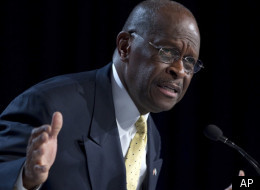 WASHINGTON -- GOP presidential candidate Herman Cain raised more questions about his knowledge of foreign policy on Sunday, saying he doesn't know anything about the "neoconservative movement," which dominated the eight years of the Bush administration.
WASHINGTON -- GOP presidential candidate Herman Cain raised more questions about his knowledge of foreign policy on Sunday, saying he doesn't know anything about the "neoconservative movement," which dominated the eight years of the Bush administration.On "Meet the Press" Sunday morning, host David Gregory asked Cain who has shaped his views on foreign policy.
"I've looked at the writings of people like Amb. John Bolton," replied Cain. "I've looked at the writings of Dr. Henry Kissinger -- KT McFarland, someone I respect."
Bolton was one of the most hawkish figures of the Bush administration, serving as the U.S. ambassador to the United Nations. He repeatedly pushed for striking Iran, and in 1994, he famously said, "If the U.N. secretary building in New York lost 10 stories, it wouldn’t make a bit of difference."
Kisssinger served as Secretary of State and National Security Adviser under Presidents Richard Nixon and Gerald Ford. McFarland is a national security analyst with Fox News who has served in the Nixon, Ford and Reagan administrations.
When Gregory then asked Cain whether he was a "neoconservative," the presidential hopeful admitted he had no idea what Gregory was talking about.
"I'm not sure what you mean by neoconservative," said Cain. "I am a conservative, yes. Neoconservative -- labels sometimes will put you in a box. I'm very conservative."
"But you're familiar with the neoconservative movement?" asked Gregory.
"I'm not familiar with the neoconservative movement," admitted Cain. "I'm familiar with the conservative movement. Let me define what I mean by the conservative movement -- less government, less taxes, more individual responsibility."
Neocons gained popularity during the term of President George W. Bush. In his 2004 inaugural address, Bush placed himself squarely within the neocon philosophy, declaring that a key foreign policy purpose of his second term would be to promote democracy "in every nation and culture, with the ultimate goal of ending tyranny in our world."
The Iraq war was heavily pushed by his neocon advisers, including Richard Perle, Doug Feith and Paul Wolfowitz.
On Sunday, Cain also said he believes the invasion of Iraq was a good idea.
"I don't think the war in Iraq was a mistake, because there were a lot of other reasons we needed to go to Iraq, and there have been a lot of benefits that have come out of Iraq," he said, although he didn't elaborate on the nature of the benefits.
"Now that being said, I don't agree with the president's approach to draw down 40,000 troops and basically leave that country open to attacks by Iran. Iran has already said that they want to wait until America leaves."
The decision to draw down troops in Iraq was put in place prior to Obama's inauguration by the Bush administration, which signed a Status of Forces Agreement with Iraq saying that all U.S. troops would be out of the country by the end of 2011.
Foreign policy has not been Cain's strong suit, and it seemed that in the beginning of his campaign, he was doing all he could to avoid talking about it. Initially when asked about his plan for Afghanistan, Cain repeatedly said that he would reveal it only if he became president.
"The right approach is: The day I’m elected president, I will start on that plan such that the day I was sworn in, I will be able to implement the plan," Cain said in a vague answer on "Fox News Sunday" in May.
When asked on Sunday how he would define victory in Afghanistan, Cain simply said he would take the advice of the commanders.
"In Afghanistan, victory is: Can we leave Afghanistan in a situation where they can defend themselves? I don't know if that's possible right now," he replied. "Because here again, what do the commanders on the ground say? What does the intelligence community say? A lot of analysis needs to go into determining whether or not there is a definition of victory in Afghanistan."
Origin
Source: Huffington
No comments:
Post a Comment